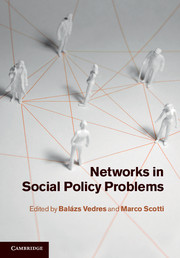Book contents
- Frontmatter
- Contents
- List of contributors
- Acknowledgements
- 1 Introduction
- Part I Information, collaboration, innovation: the creative power of networks
- Part II Influence, capture, corruption: networks perspectives on policy institutions
- Part III Crisis, extinction, world system change: network dynamics on a large scale
- 10 How creative elements help the recovery of networks after crisis: lessons from biology
- 11 Networks and globalization policies
- 12 Network science in ecology: the structure of ecological communities and the biodiversity question
- 13 Supply security in the European natural gas pipeline network
- 14 Conclusions and outlook
- References
- Index
10 - How creative elements help the recovery of networks after crisis: lessons from biology
from Part III - Crisis, extinction, world system change: network dynamics on a large scale
Published online by Cambridge University Press: 05 September 2012
- Frontmatter
- Contents
- List of contributors
- Acknowledgements
- 1 Introduction
- Part I Information, collaboration, innovation: the creative power of networks
- Part II Influence, capture, corruption: networks perspectives on policy institutions
- Part III Crisis, extinction, world system change: network dynamics on a large scale
- 10 How creative elements help the recovery of networks after crisis: lessons from biology
- 11 Networks and globalization policies
- 12 Network science in ecology: the structure of ecological communities and the biodiversity question
- 13 Supply security in the European natural gas pipeline network
- 14 Conclusions and outlook
- References
- Index
Summary
In the middle of a world economic crisis, studies of biological crisis-survival strategies, which have proven their efficiency over a billion years of evolution, may provide novel ideas and solutions. In this chapter, we summarize our knowledge and the latest results which show that the “crisis of cells,” called stress in biology, and its extreme form, programmed cell death (also known as apoptosis), induce a decrease in the inter-modular contacts of protein–protein interaction networks of yeast and human cells, respectively. Moreover, programmed cell death leads to the decomposition of several key modules of human cells. This network disintegration fits well with the general scheme of network topological phase transitions upon a decrease of resources (and/or an increase of perturbations, stress). The modular disassembly resembles changes to social networks in crisis-like situations. Thus, the re-association of cellular networks after stress and the necessity of mobile, intermodular elements (“creative elements”) for this process of “modular evolution” may give us adaptable schemes for crisis-survival strategies, proving the old observation that a crisis is not a disaster but a challenge providing a chance for development.
How can biological networks help our coping with crisis situations and our understanding of social networks?
From the second half of the twentieth century, the increasing complexity and the information-richness of our everyday life have got closer and closer to the limits of the information handling capacity of our logical, left-hemisphere brain. The Western civilization has been increasingly using (and actually, over-using) logical thinking from the very beginning and, especially, from the Enlightenment of the eighteenth century, signaling the birth of modern scientific thinking. Our schools socialize us and our children to accommodate a conceptual framework, which makes the logical assessment of the changing situations a Pavlovian conditioning of modern times.
Information
- Type
- Chapter
- Information
- Networks in Social Policy Problems , pp. 179 - 188Publisher: Cambridge University PressPrint publication year: 2012
